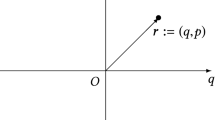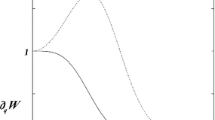Abstract
A great theorem was proven by H. Poincaré in celestial mechanics. It states that, in the most general problems of mechanics, the total energy of the system is the only well behaved first integral of the system, while other so-called integrals cannot be represented by uniform and convergent series. This very important result can be explained and visualized by comparison with standard methods of discussion, as, for example, the Hamilton-Jacobi procedure. The discussion shows that there are serious limitations to the use of this procedure, which collapses in the most general problems (Poincaré theorem) and can be used only for “almost separated” variables.
The Poincaré theorem appears to provide the distinction between determinism in mechanics and statistical mechanics according to Boltzmann.
Similar content being viewed by others
Author information
Authors and Affiliations
Additional information
Communicated by C. Truesdell
The research presented here done under Contract Nonr 266(56) and was first described in a Quarterly Report dated July 31, 1959.
Rights and permissions
About this article
Cite this article
Brillouin, L. Poincaré and the shortcomings of the Hamilton-Jacobi method for classical or quantized mechanics. Arch. Rational Mech. Anal. 5, 76–94 (1960). https://doi.org/10.1007/BF00252899
Received:
Issue Date:
DOI: https://doi.org/10.1007/BF00252899




